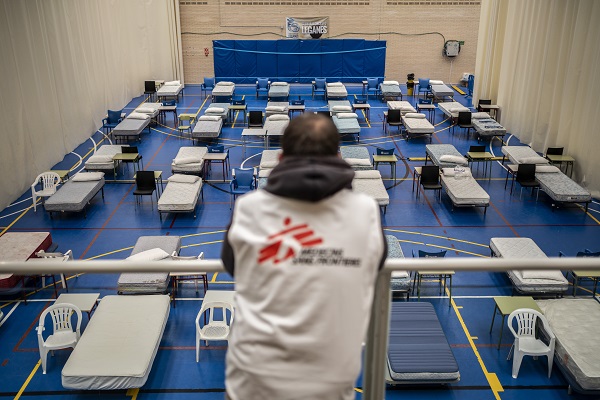 MSF temporary hospital for COVID-19 patients in Leganes, Spain;
Credit: MSF
MSF temporary hospital for COVID-19 patients in Leganes, Spain;
Credit: MSF
The international medical humanitarian organisation Médecins Sans Frontières (MSF), which has a branch in Luxembourg, has announced that it is expanding its activities and launching new projects in response to the COVID-19 (coronavirus) pandemic.
In light of the continued spread of coronavirus across European and international borders, MSF has decided to step up its response, particularly in Europe. In this context, MSF Luxembourg has made an appeal to the Luxembourg public to support the organisation.
Dr Guy Berchem, President of MSF Luxembourg, explained: "As an emergency humanitarian organisation, our priority is to provide medical assistance to the most vulnerable populations around the world".
Today in Europe, however, some of the world's most advanced healthcare systems are crumbling under the pressure of the COVID-19 pandemic. MSF teams have gotten involved because the system is overwhelmed and they have extensive emergency management experience. For instance, in Italy, Belgium and Spain, MSF has expanded its activities to support nursing homes for the elderly. In Belgium, France and Switzerland, the organisation also helps vulnerable groups, such as the homeless and migrants, who are living in precarious conditions.
Elsewhere in the world, the priority for MSF at present is to maintain the functioning of its activities in the 70 countries where it operates. MSF has expressed particular concern over how coronavirus could affect populations living in precarious environments such as those living in camps, whether they are refugees or displaced persons, in France, Iraq, Lebanon, Greece and Bangladesh, as well as the populations affected by the conflicts in Yemen and Syria. These people live in difficult conditions, prone to epidemics, and their access to care is already limited.
Dr. Guy Berchem added: "We find that COVID-19 puts pressure on some of the most advanced health systems in countries with social security, where most people have access to clean water and a place to isolate themselves. This is simply not possible for people in many countries where we usually work. What will happen when the virus spreads where health systems are more fragile and where vulnerable people cannot protect themselves?"
Another danger awaits countries whose health system is already fragile and whose energies are turning almost entirely towards the management of the pandemic: a whole section of the health system risks being forgotten and part of the population left behind. For example, malaria or measles, for which epidemic foci have recently appeared in Burkina Faso or Niger, remain diseases with high mortality in these countries and it will be necessary to be able to carry out preventive activities or vaccination campaigns in a context of fight against COVID-19. While coronavirus is not the only danger for countries with already fragile health systems, MSF has maintained that the virus outbreak will further exacerbate the vulnerabilities that threaten the lives and health of those who experience them.
Dr. Berchem concluded: “We will continue to intensify our efforts as much as possible as the crisis spreads to the countries where we operate; but to do it sustainably, we need your support". Indeed, MSF is 95% funded by private donations.
To support the organisation in its response to the current crisis, the public is asked to make a donation to the MSF COVIF-19 Crisis Fund to the bank account of Médecins Sans Frontières BIC: CCPLLULL IBAN LU75 1111 0000 4848 0000, mentioning COVID-19 Crisis Fund.








